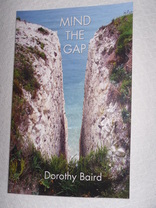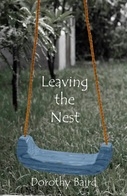Dorothy's Poetry

Mind the Gap
Dorothy has two collections of poetry:
'Mind the Gap' published in November 2015 by Indigo Dreams Publishing Ltd.
'Leaving the Nest' published in 2007 by Two Ravens Press.
Her work has been widely published in magazines and anthologies, including 'New Writing Scotland', 'Acumen',' North', and 'Obsessed with Pipework' and highly commended in poetry competitions.
Mind the Gap can be purchased from Indigo Dreams Publishing and Amazon and ordered from bookshops.
She is an accomplished and experienced reader of her own work. She was a finalist in the Shore Poets Quiet Slam in Edinburgh and very much enjoys performing her work.
She is very pleased to offer readings to groups. Please contact her for more details.
Dorothy has two collections of poetry:
'Mind the Gap' published in November 2015 by Indigo Dreams Publishing Ltd.
'Leaving the Nest' published in 2007 by Two Ravens Press.
Her work has been widely published in magazines and anthologies, including 'New Writing Scotland', 'Acumen',' North', and 'Obsessed with Pipework' and highly commended in poetry competitions.
Mind the Gap can be purchased from Indigo Dreams Publishing and Amazon and ordered from bookshops.
She is an accomplished and experienced reader of her own work. She was a finalist in the Shore Poets Quiet Slam in Edinburgh and very much enjoys performing her work.
She is very pleased to offer readings to groups. Please contact her for more details.
Mind the Gap
'There are poems of loss here, but more of gain, of the transformations of children into adults and the necessary adjustments parents must make. There are also poems of place, of the East and West coasts of Scotland, and of the natural world and its inhabitants. Dorothy shows a confidence in her use of language, and in formatting poems to give emphasis to pauses. It reads extremely well.'
Colin Will
'Dorothy's second collection is a delight. In tune with nature, the poems explore what it means to be human. I was particularly drawn to the character of Poetwoman.'
Susan Jane Sims
'Dorothy Baird catches moments as a photographer might, though always in 3D. There's depth as well as richness in and between the lines. This is an immensely readable collection.'
Eleanor Livingstone
'There are poems of loss here, but more of gain, of the transformations of children into adults and the necessary adjustments parents must make. There are also poems of place, of the East and West coasts of Scotland, and of the natural world and its inhabitants. Dorothy shows a confidence in her use of language, and in formatting poems to give emphasis to pauses. It reads extremely well.'
Colin Will
'Dorothy's second collection is a delight. In tune with nature, the poems explore what it means to be human. I was particularly drawn to the character of Poetwoman.'
Susan Jane Sims
'Dorothy Baird catches moments as a photographer might, though always in 3D. There's depth as well as richness in and between the lines. This is an immensely readable collection.'
Eleanor Livingstone
|
The Poetwoman after Pie Corbett
The poetwoman carries her poems in the pocket of her pinny. She stirs one in the pot of soup, slips one in between the cheese of her children's sandwiches, hangs one out to dry beside the socks. She stitches poems in the bones of leaves so they open in the hedgerows in the spring slides one in the purse of the tired woman at the checkout, scatters them like daisies in the park, folds them in the biscuits in the old people's home, tucks one under a swan's wide wing. When the sun sets, she shakes her pinny over the cat's dark fur, so any unfinished poems fall into its warmth. When the cat pads out into the night, her lines brush against bushes and walls, attach themselves like burrs to be read by moonlight. |
It Never Stops
The antennae that once woke me to catch a hiccup before it revved to screams now scan the quality of night to read who's out, who's in. And 'out' means stravaiging in pubs and clubs, daundering on streets with chittery bumps they don't feel, lurching for taxis, friends' floors, the last bus, while I'm the missions' sergeant in my wakeful nightie, alert for keys, creaking stairs, the sloosh of taps, counting them home. |
|
Mind the Gap
We've survived her rucksack packing – the forced discarding of dresses, shorts and tops. We've survived the photocopying of passport and insurance forms, the writing down of addresses for postcards she'll forget to send and the reassurance of a name she'll never call but I'm glad to know she could. We've survived the M8 in rush hour – eight lanes going nowhere with the clock ticking and the airport hovering like Emerald City. We've said goodbye to her bag with its hopeful label for Oz, gone up the escalators and been relieved (though neither of us says it) to have to wait for her last burger and chips on Scottish soil for what seems eternity. And we've reached the point where the next step is Departures, Security and Go To Your Gate and I don't know if I push her or she pulls away, but she disappears, small daughter with my heart stowed in the pocket of her very short shorts. |
Barra Ferry
Nodding off in the sun next thing I'm up at the rails with the rest of them gasping for the shock of their Ooh! and a splash that's not the wake. It rises again and I see it, black, white, huge: a torpedo up to the light, it loops and arcs glistening back into the sea with a farewell of a tail that tells of whale. Oh! we all go, Oh! Oh! Ooh! |
Leaving the Nest

‘These pieces are the outpouring of a remarkable talent. They are an eloquent meditation on our lives, filled with intensely personal experiences which Dorothy Baird has triumphantly universalised. In an increasingly ugly and unpredictable world, these poems are a reminder and an example of just how beautiful life can be.' Christopher Rush
Dawn at Benares
Darkness. A drumming of women
slapping and whacking
dirt from clothes. Knee deep
in the Ganges, suds floating
on the black water like flowers.
There is no sign. No movement
of the earth that asks for change
but change is written on the river
and somehow the almost light
floats in: that grey-blue time we give
no name as if we favour the gloaming dusk,
the twilight, the crepuscule,
when all promises are rescinded
and we are comfortable in regret
and not this eastern moment
when the sun begins to rise
over the smudged line above the scrub
in its veils of gauze
and we fall away
like smoke, like water, like thought
into this slow power of movement.
Growing Up
My daughter poses in front of the mirror
with nothing on. She leans, arms stretched
above her head trying on faces, and I wake
from months of blindness: this preening girl
has wintered in the darkness of her clothes
the curve of hips, the swell of breasts.
She's pouting now, lips in league
with her sultry gaze. She sways, provocative
as a lap dancer, her feet just missing
the plastic figures she was playing with
half an hour before.
Revisiting No. 33
Her home was up a clutter of stairs,
a twist of darkness, where the tap tap
of her stick tipped your spine
Black skirts. Black shawl.
Fingers like heather roots.
The wind lists now at the glass,
unpicks the paint, scatters cherry blossom
from the trees folk used to say
should have been rowans,
and there's nothing there to show
the shiver of air
that hung around her door
- those clenched-heart dares
to ring her bell and run away.
It was said she never ate, it was said
she ate the dust, it was said
she smothered children,
it was said she knew the small talk
of the moon - so many words
chased us along the street
till we'd hurtle in a heap
behind a hedge
and believe
and not believe each other.
The Shape of a Mother
The shape of a mother
shifts in all the years she learns in,
testing the sharpness of her heart
against tomorrow when her children leave.
She hides the truth in her bones.
On wintry days they ache
when she sees in her mind's eye
her home empty as the blue tit's nest
she found, its neat circle of hair,
twigs and a pink scrap of paper
from who knows where, cold
now. But what can she do
but go on doing the small things
she's so good at, lining her nest
with pieces of days, moving her joints,
remembering summer?
Dawn at Benares
Darkness. A drumming of women
slapping and whacking
dirt from clothes. Knee deep
in the Ganges, suds floating
on the black water like flowers.
There is no sign. No movement
of the earth that asks for change
but change is written on the river
and somehow the almost light
floats in: that grey-blue time we give
no name as if we favour the gloaming dusk,
the twilight, the crepuscule,
when all promises are rescinded
and we are comfortable in regret
and not this eastern moment
when the sun begins to rise
over the smudged line above the scrub
in its veils of gauze
and we fall away
like smoke, like water, like thought
into this slow power of movement.
Growing Up
My daughter poses in front of the mirror
with nothing on. She leans, arms stretched
above her head trying on faces, and I wake
from months of blindness: this preening girl
has wintered in the darkness of her clothes
the curve of hips, the swell of breasts.
She's pouting now, lips in league
with her sultry gaze. She sways, provocative
as a lap dancer, her feet just missing
the plastic figures she was playing with
half an hour before.
Revisiting No. 33
Her home was up a clutter of stairs,
a twist of darkness, where the tap tap
of her stick tipped your spine
Black skirts. Black shawl.
Fingers like heather roots.
The wind lists now at the glass,
unpicks the paint, scatters cherry blossom
from the trees folk used to say
should have been rowans,
and there's nothing there to show
the shiver of air
that hung around her door
- those clenched-heart dares
to ring her bell and run away.
It was said she never ate, it was said
she ate the dust, it was said
she smothered children,
it was said she knew the small talk
of the moon - so many words
chased us along the street
till we'd hurtle in a heap
behind a hedge
and believe
and not believe each other.
The Shape of a Mother
The shape of a mother
shifts in all the years she learns in,
testing the sharpness of her heart
against tomorrow when her children leave.
She hides the truth in her bones.
On wintry days they ache
when she sees in her mind's eye
her home empty as the blue tit's nest
she found, its neat circle of hair,
twigs and a pink scrap of paper
from who knows where, cold
now. But what can she do
but go on doing the small things
she's so good at, lining her nest
with pieces of days, moving her joints,
remembering summer?
